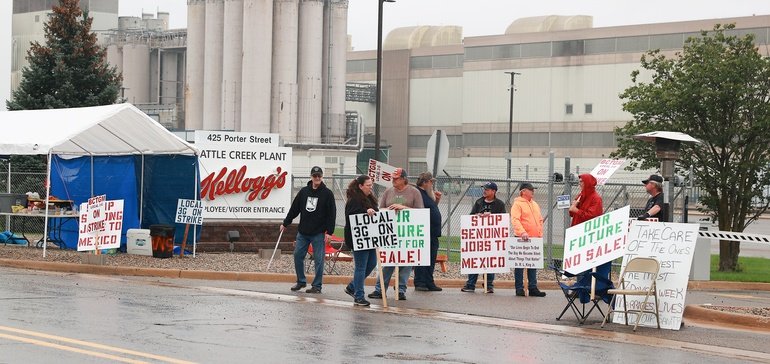As strike enters its sixth week, Kellogg wrestles with cereal supply

Dive Brief:
- Kellogg CEO Steve Cahillane told Bloomberg last week that the company is importing cereal from outside the U.S. — saying it will “leverage the totality of its global network” across Canada, Mexico, the U.K. and Australia — in order to maintain supply as a strike of 1,400 workers at its ready-to-eat cereal plants in four states enters its sixth week.
- In Kellogg’s third-quarter earnings call this past Thursday, Cahillane said that the company predicts more difficulties ahead in the fourth quarter due to the strike, which has compounded existing supply chain issues. Net cereal sales in North America were down 6.6% in the third quarter according to the company’s recent filing versus the previous year. However, Cahillane touted “very, very strong gains” in other segments, such as snacks, which rose 3.6% versus the previous year.
- The effort to maintain a flow of cereal to shelves comes as the Bakery, Confectionery, Tobacco Workers and Grain Millers International Union (BCTGM) recommended workers reject Kellogg’s latest contract proposal. In a video response this past Friday, Cahillane said that the company’s No. 1 priority is to “get back to the negotiations table and reach a contract, so our employees can get back to their jobs and live,” but said the union’s proposals were “unsustainable and unrealistic.”
Dive Insight:
In what it described as its “Last Best Final Offer,” Kellogg had attempted to address what had been a major sticking point with BCTGM. In the original contract, Kellogg had proposed a two-tiered benefit system, which the union said would have prevented new employees from eventually receiving benefits such as retirement pension plans. The president of the union’s Battle Creek chapter, Trevor Bidelman, told Food Dive last month that the two-tiered system was the primary point of contention with Kellogg’s initial contract.
Kellogg said in a statement that its new offer no longer included a “permanent two-tiered structure,” and that it added “significant wage increases” and “enhanced benefits” for employees. The company said that the union did not allow workers to vote on the proposed contract, and demanded that it do so.
“The offer that we have in front of the union right now is increased compensation on top of that already industry-leading compensation and benefits, and we’re not asking to take anything away, despite what you may have heard publicly,” Cahillane said.
In a statement, BCTGM said that the offer does not provide what workers are seeking from Kellogg, which would be a “predictable pathway to fully vested, fully benefited employment for all employees with no concessions.” It accused Kellogg of not willing to negotiate with the union’s terms and conditions.
Meanwhile, Kellogg said in a statement that it has a responsibility to its business and consumers to keep its facilities open “with other resources.” It has brought in salaried workers from the strike security firm AFIMAC to continue operations at the plants.
Kellogg CFO Amit Banati said in the company’s recent earnings call that on top of labor issues, market-driven prices of ingredients like dairy and rice, as well as higher packaging costs, have led to significantly increased levels of inflation for the company. Amid this, he said, the company has executed contingency plans to mitigate the impact on its operations.
“From a revenue growth management standpoint, we’re obviously taking action and broadly, I’d say covering our commodity-related costs and our direct costs,” Banati said. “I think some of the disruptions are hard to predict.”
Source: fooddive.com

